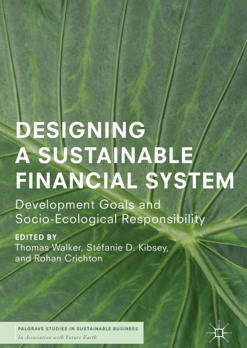
Designing a Sustainable Financial System: Development Goals and Socio-Ecological Responsibility
Editors: Walker, T., Kibsey, S. D., & Crichton, R.
© Palgrave MacMillan, 2018
This edited collection brings together leading theoretical and applied research with the intent to design a sustainable global financial future. The contributors argue that our world cannot move toward sustainability, address climate change, reverse environmental degradation, and improve human well-being without aligning the financial system with sustainable development goals like those outlined by the United Nations. Such a system would: a) be environmentally and socially responsible; b) align with planetary boundaries; c) manage natural resources sustainably; d) avoid doing more harm than good; and e) be resilient and adaptable to changing conditions. The overarching theme in this collection of chapters is a response to the worldwide, supranational sustainable finance discussions about how we can transition to a new socio-ecological system where finance, human well-being, and planetary health are recognized as being highly intertwined.
View this book on Palgrave MacMillan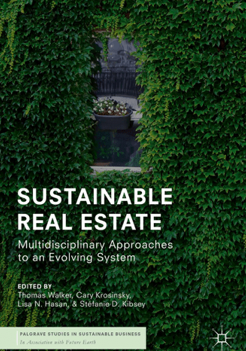
Sustainable Real Estate: Multidisciplinary Approaches to an Evolving System
Editors: Walker, T., Krosinsky, C., Hasan, L.N., & Kibsey, S.D.
© Palgrave MacMillan, 2019
This edited collection broadens the definition of sustainable real estate based on industry trends, research, and the Paris Climate Agreements. Discussions encompass existing and new buildings throughout their life cycle, the financing of their development and operations, and their impact on the surrounding environments and communities. This broader perspective provides a better understanding of the interconnected nature of the environmental, societal, communal, political, and financial issues affecting sustainable real estate, revealing the wide-ranging impact of practitioners’ decisions on the sustainable real estate system. Bringing together carefully selected articles from leading global academic and practitioner experts from urban planning, design, construction, and finance, this collection brings to light new opportunities and innovative transdisciplinary solutions to as-yet unresolved problems.
View this book on Palgrave MacMillan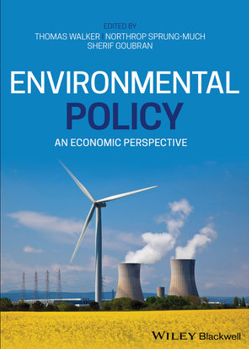
Environmental Policy and Legislation: An Economic Perspective
Editors: Walker, T., Goubran, S., & Sprung-Much, N.
© Wiley-Blackwell, 2020
Environmental Policy: An Economic Perspective offers readers a comprehensive examination of the ever-broadening scope and impact of environmental policy, law, and regulation. Editors Thomas Walker, Northrop Sprung-Much, and Sherif Goubran walk readers through a variety of subjects while maintaining a global perspective on the expanding role of environmental law. Subjects such as: Climate change legislation, Water conservation and pricing, Biodiversity of the marine environment, Wildlife ranching, Emission trading schemes, Green job strategies, and Sustainable investing.
View this book on Wiley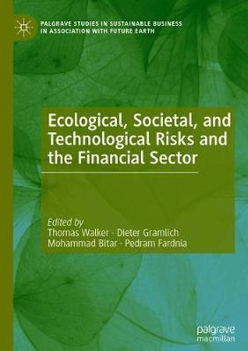
Ecological, Societal, and Technological Risks and the Financial Sector
Editors: Walker, T., Gramlich, D., Bitar, M., & Fardnia, P.
© Palgrave MacMillan, 2020
Today’s financial sector faces multiple challenges stemming from ecological, societal, and technological risks such as climate change, political extremism, and cyber-attacks. However, these non-traditional risks are yet to be fully identified and measured, in order to ensure their successful management. This edited collection sheds light on the topic by examining the unique measurement and modelling challenges associated with each of these risks, and their interaction with finance. Specifically, it identifies and classifies evolving risks from outside (and inside) the financial system, explores approaches to assess and operationalize non-traditional risks in finance, and illustrates how they affect the financial system, thereby exploring the vulnerability of financial institutions and financial markets. Offering a comprehensive analysis of non-traditional finance risks, the authors provide the basis for developing appropriate risk management techniques. With new approaches to protect against ecological, societal, and technological threats to the financial sector, this edited collection will appeal to academics researching sustainability, development finance, and risk management, as well as policy-makers and practitioners within the banking sector.
View this book on Palgrave MacMillan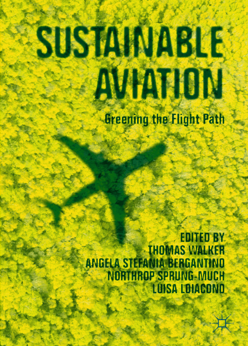
Sustainable Aviation: Greening the Flight Path
Editors: Walker, T., Bergantino, A.S., Sprung-Much, N., & Loiacono, L.
© Palgrave MacMillan, 2020
This book highlights the latest research in the field of Sustainable Aviation. In recent decades, there have been considerable improvements in aircraft efficiency and noise reduction. However, with the demand for both passenger and freight transportation expected to increase significantly in future years, the aviation sector is becoming a growing source of environmental problems and a major contributor to global warming. Focusing on the need to address this mounting problem, this book discusses important new trends and outlines likely future developments in carbon emission reduction, carbon trading, and the impact of emerging technologies, as well as social, legal, and regulatory changes as they pertain to the aviation sector.
View this book on Palgrave MacMillan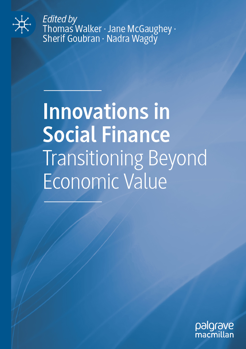
Innovations in Social Finance – Transitioning Beyond Economic Value
Editors: Walker, T., McGaughey, J., Goubran, S., Wagdy, N.
© Palgrave MacMillan, 2021
Our world is experiencing increasingly complex social and
environmental challenges. The prevailing business models and, to
some extent, capitalism per se, are frequently blamed for these
problems due to their neglect of social and environmental values
in favour of financial returns. Within this context, social
finance has attracted the attention of governments,
organizations, entrepreneurs, and researchers as a means of
mobilizing resources and innovation with the goal of
establishing effective long-term solutions.
This edited collection summarizes, discusses, and analyzes new
innovative trends in social finance. It features contributions
that aim to highlight emerging trends (products, tools, and
processes) in social finance, present a series of case studies
related to the development, deployment, and scaling of social
finance innovations, offer an understanding of how non-economic
externalities are being incorporated, managed, and assessed in
recent innovations, reveal the disruptive potential of social
finance innovations by analyzing how they are redefining
mainstream finance, analyze the scales – of operation and impact
– of different innovations, and explore the complex relationship
between social finance and social innovation.
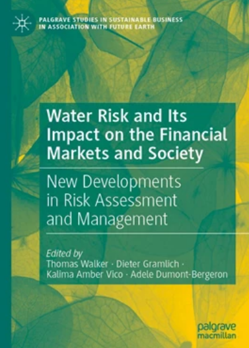
Water Risk and Its Impact on the Financial Markets and Society
Editors: Walker, T., Gramlich, D., Vico, K., & Dumont-Bergeron, A.
© Palgrave MacMillan - Palgrave Studies in Sustainable Business in association with Future Earth, 2021
Water risks, including the lack of access to fresh water for personal and industrial use, droughts, floods, and water contamination, are problems that are not new, yet, they are amplifying in the face of climate change, population growth, and rapid economic development. Properly identifying, measuring, and managing these risks as well as taking advantage of related mitigation opportunities is essential for the future well-being of firms across various industries, investors who invest in these firms, local and federal governments, and ultimately our society as a whole. This edited book sheds light on this topic by examining the unique measurement and modelling challenges associated with either the scarcity or overabundance of water and their interaction with finance and society. Specifically, it explores approaches to assess and operationalize water risk, examines the vulnerability of institutions and markets, and discusses strategies for risk mitigation.
View this book on Palgrave MacMillan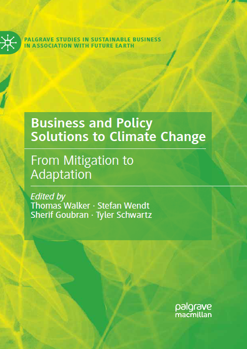
Business and Policy Solutions to Climate Change: From Mitigation to Adaptation
Editors: Walker, T., Wendt, S., Goubran, S., & Schwartz, T.
© Palgrave MacMillan - Palgrave Studies in Sustainable Business in association with Future Earth, 2022
This edited book aims to ignite both an academic and practitioner-oriented discussion regarding the question how the business and government sector can adapt to today’s fast-changing climate. Specifically, the collection seeks to explore how businesses and policy makers can prepare for a world where freshwater is scarce, extreme weather events are common, floods and wildfires are frequent, and global sea levels rise by more than two meters. In addition to assessing incremental approaches, it explores strategies that employ interdisciplinary and innovative solutions to climate change adaptation. The chapters included in this book examine and propose business and policy solutions for climate-induced economic, technical, urban, and societal challenges. It draws on an international range of prominent authors and, therefore, will be of interest for academics and practitioners working in the field of sustainability management, sustainable finance, sustainable operations management, food management, strategy, and environmental management. It can also serve as a valuable guide for practitioners and policymakers in those fields.
View this book on SpringerLink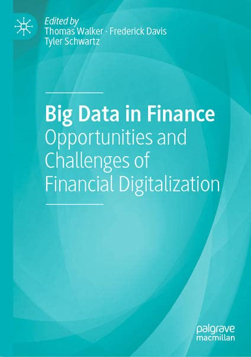
Big Data in Finance – Opportunities and Challenges of Financial Digitalization
Editors: Walker, T., Davis, F., & Schwartz, T.
© Palgrave MacMillan, 2022
This edited book explores the unique risks, opportunities, challenges, and societal implications associated with big data developments within the field of finance. While the general use of big data has been the subject of frequent discussions, this book will take a more focused look at big data applications in the financial sector. With contributions from researchers, practitioners, and entrepreneurs involved at the forefront of big data in finance, the book discusses technological and business-inspired breakthroughs in the field. The contributions offer technical insights into the different applications presented and highlight how these new developments may impact and contribute to the evolution of the financial sector. Additionally, the book presents several case studies that examine practical applications of big data in finance. In exploring the readiness of financial institutions to adapt to new developments in the big data/artificial intelligence space and assessing different implementation strategies and policy solutions, the book will be of interest to academics, practitioners, and regulators who work in this field.
View this book on SpringerLink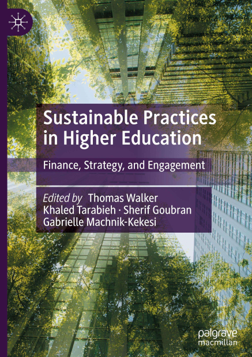
Sustainable Practices in Higher Education: Finance, Strategy, and Engagement
Editors: Walker, T., Tarabieh, K., Goubran, S., & Machnik-Kekesi, G.
© Palgrave MacMillan, 2023
This edited collection presents, reviews, and critically analyzes sustainable practices and long-term-oriented decision-making in Higher Education Institutions (HEIs). Campus closures and the quick transition to hybrid or e-learning as a result of the COVID-19 pandemic caused HEI stakeholders, including students, faculty, and staff, to swiftly adopt new ways of learning, teaching, and administering that were unfathomable only months before. This radical and challenging shift left many in academia with a sense that there is tremendous potential for HEIs to take the lead – both from an educational and practical standpoint – in fostering on- and off-campus sustainability and combatting climate change. In this book, the editors and their contributors systematically highlight current challenges that are slowing or derailing HEIs’ finance-related initiatives and practices geared toward sustainability. The case studies collected in this book provide a holistic overview of the ways in which financial and other long-term decisions can lead to more sustainable practices in higher education.
View this book on SpringerLink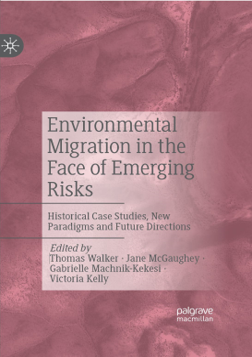
Environmental Migration in the Face of Emerging Risks: Historical Case Studies, New Paradigms, and Future Directions
Editors: Walker, T., McGaughey, J., Machnik-Kekesi, G., & Kelly, V.
© Palgrave MacMillan, 2023
This book will provide a space for new and emergent research in environmental migration, particularly in the context of a world beginning to emerge from the grip of a debilitating public health crisis that kept many firmly rooted in place while displacing others internationally. With famines, vast wildfires, droughts, and record heatwaves uprooting human settlements internationally, research on migration in the face of emerging risks is all the more urgent. As Balsari, Dresser, & Leaning point out, “the wall-building, xenophobic, and insular” platforms of some global powers in their immigration and asylum policies, and the ever-increasing stresses placed on the natural world that continue to make sites of human settlement less and less hospitable, make research on this topic both very timely and much needed. This book will include numerous case studies, historical analyses, projections, models, and recommendations for both policy and future research directions. Contributions are drawn from academics and practitioners in this fertile interdisciplinary field of academic inquiry, and each one focuses on the intersection of population and environment studies, history, geography, law, diaspora studies, economics, public health, and sociology. This book is composed of five clear sections. The introductory section includes one chapter that presents an overview of the current landscape, the scope and objectives of the book, as well as its specific approach and the various themes. The concluding section is composed of one chapter that presents a global map of recent innovations drawing together some of the core themes discussed throughout the book. The concluding chapter synthesizes the challenges and opportunities presented, and the possible future directions that researchers, practitioners, and regulators could and should move towards.
View this book on SpringerLink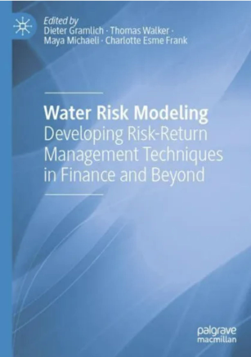
Water Risk Modeling: Developing Risk-Return Management Techniques in Finance and Beyond
Editors: Gramlich, D., Walker, T., Michaeli, M., & Frank, C. E.
© Palgrave MacMillan, 2023
This book sheds light on the topic of financial water risk by examining the modeling challenges associated with physical, regulatory, and reputational water risk in finance. It explores various approaches to operationalize water risk from a financial analysis, investment management, and climate science perspective. The analysis of tools to assess water risk provides the basis for the development of appropriate risk-return management techniques in finance and beyond. This book provides new insights by focusing on financial water threats and their related opportunities. It will be of interest to both academics and practitioners who work at the interface of finance, economics, nature, and society.
View this book on SpringerLink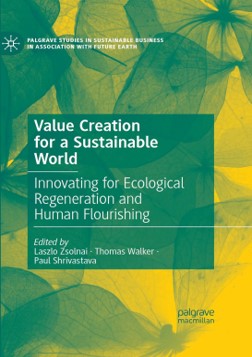
Value Creation for a Sustainable World: Innovating for Ecological Regeneration and Human Flourishing
Editors: Zsolnai, L., Walker, T., & Shrivastava, P.
© Palgrave Studies in Sustainable Business in association with Future Earth, 2023
The ecological, social and technological challenges of the Anthropocene require developing and implementing new economic, business, and financial models to create sustainable value for a wide range of stakeholders including nature, society, and future generations. This book defines ‘sustainable value creation’ as bringing forth products, services, organizational forms, processes, actions, and policies which satisfy real social needs and contribute to the ecological regeneration of nature. The book collects and analyzes innovative economic, business, and social models of sustainable value creation globally. It critically examines the existing mainstream models of business and financial value creation. In reviewing both traditional and sustainability-oriented models, it focuses on both the challenges and opportunities inherent in a possible shift from models based on single-stakeholder wealth creation to models that propagate multidimensional value creation. Part of the Palgrave Studies in Sustainable Business in Association with Future Earth series, this book aims to engage academics, and business and civil society practitioners to discuss innovative value creation models for a sustainable world. Interdisciplinary and intercultural exchange will be facilitated to inspire and cross-fertilize different knowledge and action fields as well as to promote intergenerational dialogue about the prospects of the human-earth system.
View this book on SpringerLink
The Role of Design, Construction, and Real Estate in Advancing the Sustainable Development Goals
Editors: Walker, T., Cucuzzella, C., Goubran, S., & Geith, R.
© Springer Nature - Sustainable Development Goals Series, 2023
This edited book brings together insights from scholars and practitioners from many different fields to uncover the role of the construction and real estate sectors and how they align with the Sustainable Development Goals (SDGs). It follows a lifecycle-based approach to the topic, addressing the design, construction, management, investment, and regulatory dimensions of projects in the area. It expands the reader’s understanding of the built environment beyond the design and construction phases, which enables the collection to explore the links and transitions between different project phases and uncover new methodologies that aim to tackle systemic sustainable development challenges. The chapters’ comprehensive coverage allows the collection to capitalize on the strengths and weaknesses of the building industry, highlight emerging trends, and uncover some critical gaps that need to be addressed to attain the 2030 vision. This puts into perspective the interconnected nature of the SDGs and highlights the importance of multi-stakeholder collaborations in achieving them.
View this book on SpringerLink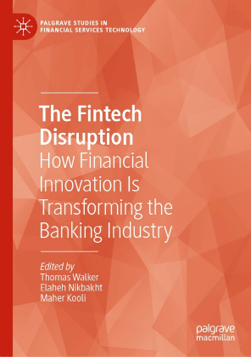
The Fintech Disruption: How Financial Innovation Is Transforming the Banking Industry
Editors: Walker, T., Nikbakht, E., & Kooli, M.
© Palgrave MacMillan - Palgrave Studies in Financial Services Technology, 2023
This book provides both practice-oriented and academic insights into the disruptive power of fintech for the banking industry. It explores (1) whether and how the banking industry can use newly emerging technologies in the financial sphere to its advantage while managing any associated risks, (2) how these technologies affect traditional banking service formats as well as the pricing of these services, and (3) whether the emergence of fintech in the banking industry calls for a rethinking of existing banking regulations such as the Basel Accords as well as country-specific regulations. Prior publications in this area typically examine both current applications of fintech in the banking industry, as well as its future prospects, by analyzing actual cases or exploring the impact of a single emerging technology on the banking industry. They often ignore the interdependence between emerging technologies and overlook the connection between fintech as a whole and the future of the banking industry. This book addresses this gap by providing a comprehensive overview of various fintech applications and by analyzing what they mean for the future of banking. Given the potentially disruptive power of fintech, the book will focus on the challenges banking supervisors are likely to encounter as a result of fintech’s continual ascent. It will thus encourage readers to think about and explore how to find a balance between the beneficial aspects of fintech and the challenges it creates in terms of supervision, regulation, and risk management.
View this book on SpringerLink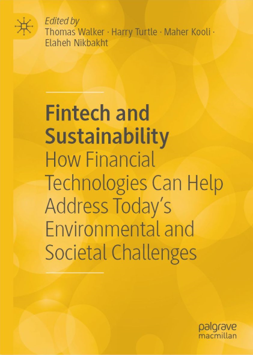
Fintech and Sustainability: How Today’s Technologies Can Help Address Today’s Environmental and Societal Challenges
Editors: Walker, T., Turtle, H., Kooli, M., & Nikbakht, E.
© Palgrave MacMillan, 2023
Financial technologies (fintech) can improve sustainability, influence policies, and require new regulations. Climate change, water pollution, and non-renewable resources management can all be addressed with fintech innovations. Despite the advantages offered by fintech, opponents warn of potential negative consequences. The application of fintech in sustainability is a double-edged sword requiring further investigation.
This book provides an overview of fintech applications and considers their impact on the future of sustainable finance. It explores how financial technologies can enhance the sustainability of investment and corporate decisions and contribute to the fulfilment of the Sustainable Development Goals (SDGs). By considering practitioner and academic views, it examines whether and how fintech can improve sustainable practices, potential threats with possible solutions, and policies and regulations designed to improve sustainability benefits.
View this book on SpringerLink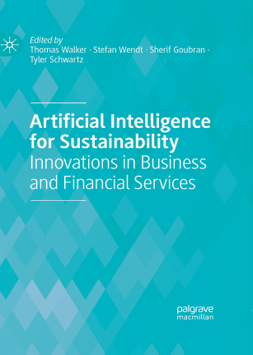
Artificial Intelligence for Sustainability: Innovations in Business and Financial Services
Editors: Walker, T., Wendt, S., Goubran, S., & Schwartz, T.
© Palgrave MacMillan, 2024
In light of the climate crisis, businesses are expected to embrace sustainability to reduce their negative impacts on the environment and society, while at the same time strengthening their organisations’ positive impacts. Managing this alongside the traditional requirements of business requires careful handling, and it is small wonder that some are heralding the advantages posed by artificial intelligence (AI) as the missing piece of the puzzle.
This edited book aims to present a balanced discussion of the benefits and costs of using AI for the natural environment and society, including an analysis of its potential to help meet the UN’s Agenda 2030 and the Sustainable Development Goals. Researchers, practitioners, regulators, and entrepreneurs at the forefront of sustainable AI solutions share insights into the different sustainable applications of AI and highlight how these new developments may affect and contribute to our fight against climate change and address further environmental and social challenges. This volume will be of great interest to scholars and students of digital business and new technologies, sustainability, and strategy.
View this book on SpringerLink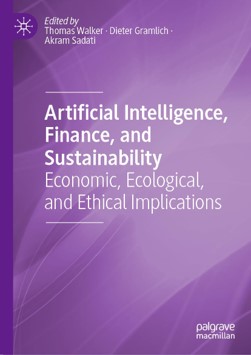
Artificial Intelligence, Finance, and Sustainability: Economic, Ecological, and Ethical Implications
Editors: Walker, T., Gramlich, D., & Sadati A.
© Palgrave MacMillan, 2024
As the world increasingly recognizes the importance of sustainability, businesses and investors are looking for ways to integrate sustainable practices into their operations and investment decisions. At the same time, advancements in artificial intelligence (AI) and technology are transforming the finance industry and are enabling more data-driven decision-making. The intersection of these fields presents a significant opportunity to accelerate progress towards a more sustainable future, while also improving financial performance.This book explores the crucial role of AI in sustainability and finance, examining how financial technologies and machine learning are shaping the approach of finance professionals towards environmental, social, and governance (ESG) issues. It provides a comprehensive and integrated perspective on how these areas are becoming increasingly intertwined and examines the ethical and social implications of AI in finance and its potential to unlock new opportunities for sustainability. By focusing on the practical implications of these intersections and including both case studies and expert analysis, the book provides valuable insights for practitioners, policymakers, academics, and students alike.
View this book on SpringerLink
Modellierung von Wasserrisiken: Entwicklung von Techniken zur Risiko-Rendite-Steuerung in der Finanzwelt und darüber hinaus
Editors: Gramlich, D., Walker, T., Michaeli, M., & Frank, C. E.
© Palgrave MacMillan, 2024
Dieses Buch beleuchtet das Thema finanzielles Wasserrisiko, indem es die Modellierungs-Herausforderungen untersucht, die mit physischem, regulatorischem und Ruf-bedingtem Wasserrisiko in der Finanzwelt verbunden sind. Es erkundet verschiedene Ansätze zur Operationalisierung von Wasserrisiken aus finanzieller Analyse, Investmentmanagement und Klimawissenschaft. Die Analyse von Instrumenten zur Bewertung von Wasserrisiken bildet die Grundlage für die Entwicklung geeigneter Risiko-Rendite-Steuerungstechniken in der Finanzbranche und darüber hinaus. Dieses Buch liefert neue Einblicke, indem es sich auf finanzielle Wassergefahren und die damit verbundenen Chancen konzentriert. Es wird sowohl für Wissenschaftler als auch Praktiker von Interesse sein, die an der Schnittstelle von Finanzen, Wirtschaft, Natur und Gesellschaft tätig sind.
View this book on SpringerLink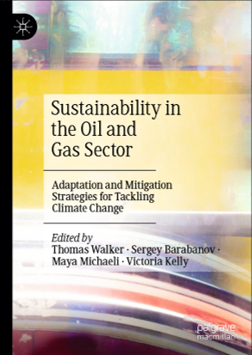
Sustainability in the Oil & Gas Industry: Adaptation and Mitigation Strategies for Tackling Climate Change
Editors: Walker, T., Barabanov, S., & Michaeli, M., & Kelly V.
© Palgrave MacMillan, 2024
The push for sustainability in the oil and gas sector has taken center stage in both climate action debates and mitigation/adaptation efforts in recent decades. As the global mission for sustainable energy increasingly moves away from oil and gas as primary resources, the study of sustainability in the industry is often posited as counterintuitive. However, it is imperative to unearth methods to integrate sustainability efforts in the oil and gas industry, as it will likely retain its prominence in the foreseeable future. This book ignites academic discussion regarding ongoing and necessary mitigation and adaptation strategies in the oil and gas industry that will help address the ongoing climate crisis.
The chapters featured in this collection pose several important queries regarding current sustainability efforts in the oil and gas industry and propose avenues for improvement. In particular, they focus on carbon emissions in exploration and production, land use patterns andbiodiversity, and ethics in the oil and gas industry. Working against the background of the UN Agenda 2030 and Sustainable Development Goals, this book will be of great interest to academics and students of sustainability strategies, energy, innovation, and business ethics, as well as policymakers and practitioners tasked with analyzing these areas.
View this book on SpringerLink
Sustainable Tourism: Frameworks, Practices, and Innovative Solutions
Editors: Walker, T., Demir, E., & Machnik-Kekesi, G., Kelly, V.
© Palgrave MacMillan, 2024
This edited volume aims to ignite an academic discussion regarding necessary, and urgent, adaption and mitigation strategies for the tourism industry. Now more than ever, there is a need for designing and implementing concrete strategies for a world in which tourism practices are sustainability-minded, not only to rescue this key industry from the devastating effects of the COVID-19 pandemic, but also to limit the effects that it has on pollution, climate change, and at-risk populations. Achieving this goal will require innovations that can help us synchronously adapt to committed change as well as shift our planning processes and alter our behaviours.
Including contributions from international experts in the fields of tourism management, economics, political science, finance, business, and sustainability, this book provides much-needed research on sustainable tourism by evaluating current and future trends, global contributions, case studies and new research evaluating issuessuch as over-tourism and under-tourism, as well as the general effects that tourism have on a region’s economy, environment, culture, and society. In addition, it will explore how sustainable tourism can help alleviate, mitigate, or control these problems.
This book aims to provide insight into how we can still enjoy and benefit from touristic travel while implementing appropriate strategies and adaptation plans in the areas of health, culture, the economy, and the environment and showcase investigations of alternative tourism frameworks and tourist perspectives. It will be of great interest to academic and practitioner communities in business and policy, as well as economics, tourism management, development studies, finance, cultural heritage management, policymaking and entrepreneurship.
View this book on SpringerLink